Each character entry below contains a ≤1 MB QuickTime movie of the character being painted with a brush, created by Prof. Saeko Komori of Chubu University. Please see the JP Net Kanji Project for more details.
In the following definitions, on (Chinese-based) readings are represented by katakana, and by capital romaji letters; kun (native Japanese-based) readings are represented by hiragana, and by lower-case romaji letters. This is a common dictionary convention, and does not have any bearing on meaning.
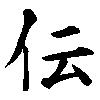
Video: Writing and pronunciation
Printed form: 伝
Readings: つた tsuta
Meaning: transmit
Mnemonic:
People 人 (on the left) love to gossip when they meet 会.
Usage Examples:
手伝う (てつだう) to help
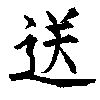
Video: Writing and pronunciation
Printed form: 送
Readings: おく oku
Meaning: send
Mnemonic:
A present with a ribbon is going to be sent.
Usage Examples:
送る (おくる) to send
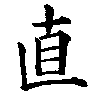
Video: Writing and pronunciation
Printed form: 直
Readings: なお nao
Meaning: fix; cure
Mnemonic:
This character means "to fix to be straight". Careful eyes 目 fix things 十 straight with a ruler - the bottom perpendicular stroke.
Usage Examples:
直す (なおす) to fix
書き直す (かきなおす) to rewrite
直る (なおる) to get fixed
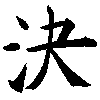
Video: Writing and pronunciation
Printed form: 決
Readings: き ki
Meaning: decide
Mnemonic:
A person 人 who decides the course of the water (the radical on the left).
Usage Examples:
決める (きめる) to decide
決まる (きまる) to become decided
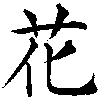
Video: Writing and pronunciation
Printed form: 花
Readings: はな hana
Meaning: flower
Mnemonic:
The grass radical on the top and a character 化 "to change". [茶 (ちゃ) "tea; brown"]
Usage Examples:
花 (はな) flower
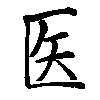
Video: Writing and pronunciation
Printed form: 医
Readings: イ I
Meaning: medicine
Mnemonic:
Arrows 矢 stored in a box. [知 (し) "know"]
Usage Examples:
医学 (いがく) medical science
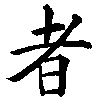
Video: Writing and pronunciation
Printed form: 者
Readings: シャ SHA
Meaning: person
Mnemonic:
A person who works daily 日 on a farm soil 土 with a tool ノ.
Usage Examples:
医者 (いしゃ) medical doctor
学者 (がくしゃ) scholar
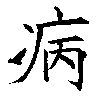
Video: Writing and pronunciation
Printed form: 病
Readings: ビョウ BYOO
Meaning: illness
Mnemonic:
The sickness radical and a person 人 sleeping on a bed covered in a blanket.
Usage Examples:
病気 (びょうき) illness
病院 (びょういん) hospital
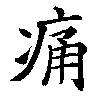
Video: Writing and pronunciation
Printed form: 痛
Readings: いた ita
Meaning: painful; hurts
Mnemonic:
The sickness radical and katakana マ (person bending down with pain) and 用 (lots of affairs to attend).
Usage Examples:
痛い (いたい) painful
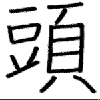
Video: Writing and pronunciation
Printed form: 頭
Readings: あたま atama
Meaning: head
Mnemonic:
The big shell radical 頁 and 豆 (beans). [お願い (おねがい) "request"]
Usage Examples:
頭がいい be smart
頭が痛い to have a headache
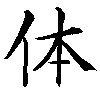
Video: Writing and pronunciation
Printed form: 体
Readings: からだ/タイ karada/TAI
Meaning: body
Mnemonic:
The person radical and 本, the origin and source (of knowledge).
Usage Examples:
体 (からだ) body
大体 (だいたい) for the most part
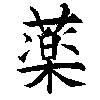
Video: Writing and pronunciation
Printed form: 薬
Readings: くすり kusuri
Meaning: medicine
Mnemonic:
A medicine made from grass (on the top) to make oneself relaxed.
Usage Examples:
薬 (くすり) medicine
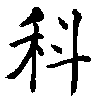
Video: Writing and pronunciation
Printed form: 科
Readings: カ KA
Meaning: division; branch
Mnemonic:
禾 grains and a standard container 斗.
Usage Examples:
内科 (ないか) internal medicine
外科 (げか) external medicine
教科書 (きょうかしょ) textbook
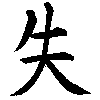
Video: Writing and pronunciation
Printed form: 失
Readings: シツ SHITSU
Meaning: lose
Mnemonic:
An arrow 矢 went through the top 失.
Usage Examples:
失礼する (しつれいする) to excuse oneself
失礼な人 (しつれいなひと) impolite person
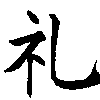
Video: Writing and pronunciation
Printed form: 礼
Readings: レイ REI
Meaning: gratitude, civility
Mnemonic:
When you are at a shrine 社, you have to show your thanks to God.
Usage Examples:
お礼 (おれい) gratitude
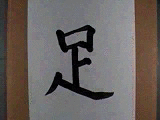
Video: Writing and pronunciation
Printed form: 足
Readings: ソク / あし SOKU / asi
Meaning: leg; foot
Usage Examples:
手と足 (てとあし) hands and legs
足が速い (あしがはやい) runs / walks fast
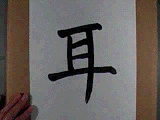
Video: Writing and pronunciation
Printed form: 耳
Readings: ジ / みみ ZI / mimi
Meaning: ear
Usage Examples:
目と耳と口 (めとみみとくち) eyes, ears, and mouths
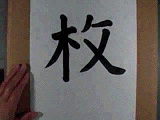
Video: Writing and pronunciation
Printed form: 枚
Readings: マイ MAI
Meaning: sheet (counter for flat thin object)
Usage Examples:
百枚 (ひゃくまい) one hundred sheets
何枚も (なんまいも) a large number of flat units
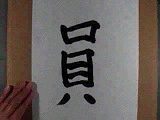
Video: Writing and pronunciation
Printed form: 員
Readings: イン IN
Meaning: member, staff
Usage Examples:
銀行員 (ぎんこういん) banker
店員 (てんいん) shop clerk
New Readings
| KANJI | READINGS |
|---|---|
| 口 | (くち), mouth |
| 木 | (き), tree |
| 出す | (だす), to take out |
| 茶の間 | (ちゃのま), living room |
| 家の外 | (うち(/いえ)のそと), outside the house |
| 近所 | (きんじょ), neighborhood |
| 部屋 | (へや), room |
[Quizzes (JavaScript required): Meaning (16 questions) | Reading (20 questions) | Character Recognition (14 questions)]
